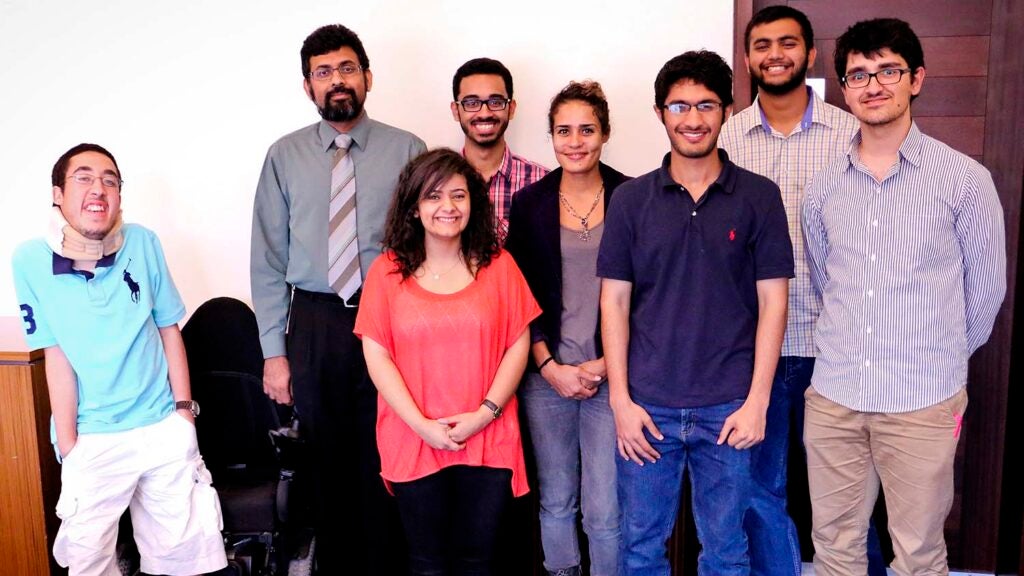Georgetown Students Advance Financial Literacy in Qatar’s Migrant Community

The findings of an Undergraduate Research Experience Program (UREP) project at Georgetown University in Qatar (GU-Q) titled “Advancing Financial Literacy for Transnational Families” were shared at a public lecture attended by members of the university campus and Qatar community.
Over the course of a year and a half, a six student team took on the task of researching, developing, and testing their project: educational videos based on a structured financial education curriculum for migrant workers and their households. The financial education aims to encourage migrants and their households in their home country to maximize the benefits of temporarily living and working abroad through long-term and sound financial planning. The five video training modules will teach participating migrants about financial savings, how to make a migration plan, how to create and follow a budget, how to manage debt, and how to manage investments. The videos were developed on a peer-based learning model featuring migrant workers sharing their personal experiences in their own words, as well as advice from field experts.
The student team included GU-Q students Ahwaz Akhtar (GU-Q ’16), Hisham Hassan (GU-Q ’15), Fatema Hubail (GU-Q ’16), Salar Khan (GU-Q ’15), Atul Menon (GU-Q ’15), Salman Ahad Khan (GU-Q ’16), and Sherif Elgindi (GU-Q ’16).
Hisham, a junior studying International Politics, said: “The project was a terrific research opportunity to design a program that would benefit the Gulf’s large low-income migrant worker communities. Financial education interventions have already been proven to have a high potential for positive impact, and this project is an innovative attempt at scaling it up for large audiences through digital media platforms. Our focus on tailoring content specifically for migrants in the region will hopefully help improve their current living standards and financial situations.”
Explaining the importance of the videos, Atul Menon, a student majoring in International Economics, said: “This project is very relevant in Qatar today. Financial education is often ignored, but is crucial for migrants, especially those who receive low incomes. With an influx of migrants into the country, there needed to be an effort to assist with financial matters. People migrate here primarily for financial reasons and are expected to return home after a period of time. Hence, financial literacy is important.”
“This project can be immensely helpful for low-income migrants to Qatar as it will allow them to make the most of their migration journey and help them to adopt good financial practices,” added Ahwaz Akhtar, also an International Economics major.
“At Georgetown, students take an active role in research that helps advance the frontier of knowledge as well as to apply the skills derived in the classroom to real world issues,” said Dr. Suzi Mirgani, Manager and Editor for CIRS Publications as well as Co-mentor for the project. Dr. Mirgani’s main role was to bring in technical expertise to the film-based project and to advise the students on the best possible presentation of the content. Dr. Ganesh Seshan, who teaches economics at the school, served as the Principal Investigator (PI) and primary faculty member for the project. Professor Seshan also led three of the students to Kerala, India, to engage with migrant families and return migrants. “To our knowledge, this is the first set of instructional videos that have been developed for a Qatar-based migrant community to provide guidance on issues of financial education and management,” he said.
The GU-Q team project beat out 60 other competitors to be named winner of the Student Poster Presentations Award, announced during the gala dinner of Qatar Foundation’s Annual Research Conference (ARC’14), held recently under the patronage of HH Sheikha Moza bint Nasser, chairperson of Qatar Foundation.
The students have set up several online forums dedicated to the dissemination of the research materials and instructional videos, including a website[SM1] , Facebook, and YouTube channel. Future plans are in place to assess the impact of the project on participating migrants and their families. The project was made possible by a UREP award from the Qatar National Research Fund, a member of The Qatar Foundation.
In terms of next steps, the research team has plans to undertake an impact evaluation study of offering the videos to be viewed by a migrant audience and determining its impact on financial habits and behavior over a period of time. Additional work is also needed to produce the videos in other languages spoken by migrant communities in Qatar such as Hindi, Nepalese, Tagalog and Arabic. Interested parties who would like to know more about the video project and are interested in supporting ongoing efforts are invited to contact Dr. Seshan or Dr. Mirgani.